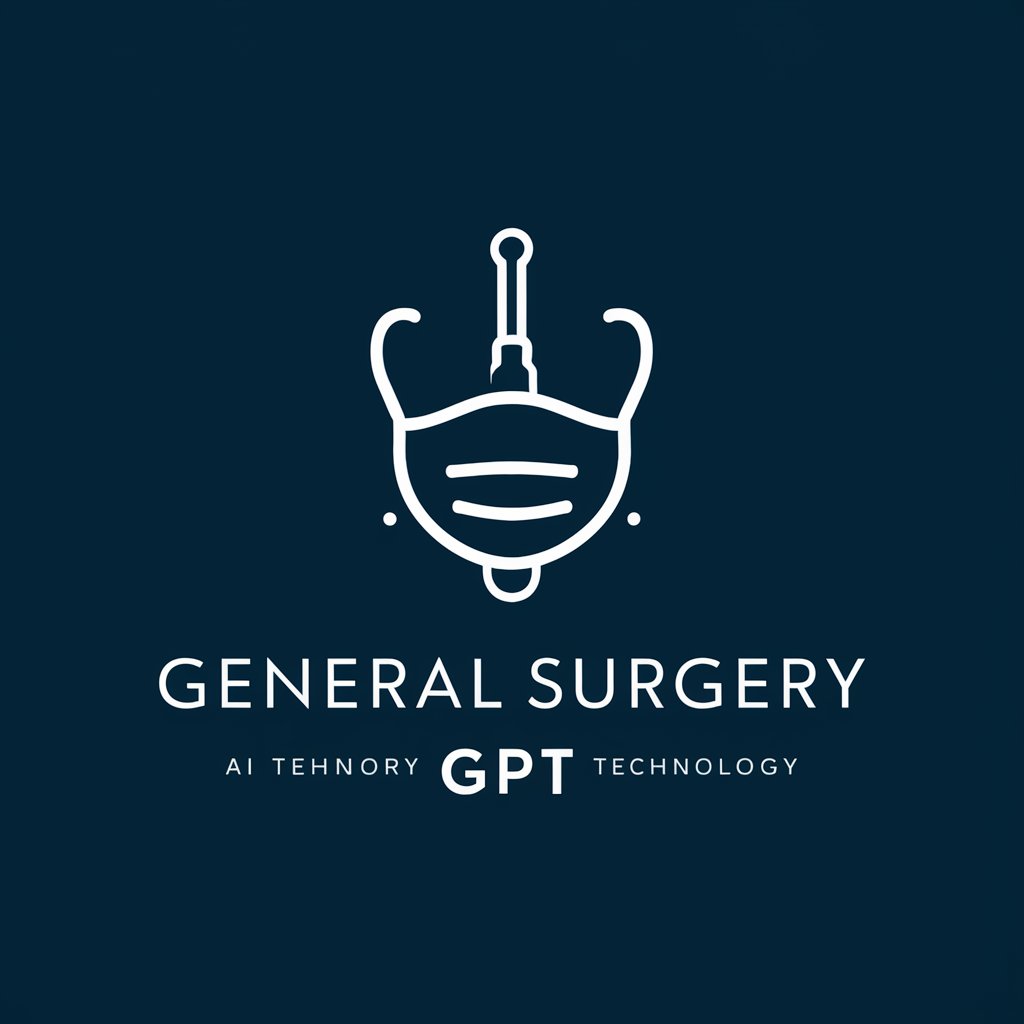General Surgery GPT - General Surgery Insights

Welcome to General Surgery GPT, your trusted surgical reference tool.
Empowering Surgery with AI
What are the indications for laparoscopic cholecystectomy?
Can you explain the steps involved in an inguinal hernia repair?
What are the common complications of thyroid surgery?
How should postoperative pain be managed after an appendectomy?
Get Embed Code
Overview of General Surgery GPT
General Surgery GPT is a specialized artificial intelligence tool designed to support and enhance the field of general surgery. It amalgamates knowledge from authoritative surgical texts, articles, and continuous user interaction to offer comprehensive insights into surgical procedures, pharmacology, and patient management strategies. The design purpose of General Surgery GPT is to serve as a robust reference tool that aids in the decision-making process for practitioners by providing detailed, up-to-date information tailored to the nuances of general surgery. For example, it can generate a step-by-step guide for performing a cholecystectomy, suggest pharmacological management for postoperative pain, or offer strategies for managing complex patient cases, thereby illustrating its multifaceted utility in surgical practice. Powered by ChatGPT-4o。

Core Functions of General Surgery GPT
Surgical Procedure Guidance
Example
Detailed walkthroughs of surgical procedures such as appendectomies or hernia repairs, including variations in technique, potential complications, and evidence-based best practices.
Scenario
A surgical resident preparing for an appendectomy can use General Surgery GPT to review the steps of the procedure, understand common pitfalls, and learn about the latest techniques to ensure a successful outcome.
Pharmacological Advice
Example
Recommendations for preoperative, intraoperative, and postoperative medication management, focusing on dosages, drug interactions, and side effect mitigation.
Scenario
A surgeon planning a patient's pain management strategy post-laparotomy might consult General Surgery GPT for advice on optimal analgesic combinations, considering the patient's history and current medications.
Patient Management Strategies
Example
Insights on managing patients with comorbidities, nutritional advice for recovery, and guidelines for postoperative care.
Scenario
A general surgeon managing a diabetic patient undergoing a surgical procedure could use General Surgery GPT for tailored advice on glycemic control, wound care, and dietary modifications to promote healing and reduce complications.
Target User Groups for General Surgery GPT
Surgical Practitioners
Surgeons, surgical residents, and operating room nurses seeking up-to-date information on surgical techniques, patient care, and pharmacology would find General Surgery GPT invaluable for enhancing their clinical practice and patient outcomes.
Medical Educators
Professors and instructors in medical schools and surgical training programs can leverage General Surgery GPT to supplement their teaching materials, offer students access to a wide range of scenarios, and encourage critical thinking and problem-solving skills in a clinical context.
Healthcare Policy Makers
Individuals involved in creating guidelines, protocols, and policies for surgical practices can use General Surgery GPT to ensure their recommendations are grounded in the latest surgical knowledge and best practices, thereby enhancing the quality of surgical care.

How to Use General Surgery GPT
Start Your Journey
Begin by visiting yeschat.ai to access a free trial of General Surgery GPT without the need for login or subscribing to ChatGPT Plus.
Identify Your Need
Determine the specific information or assistance you require. This could range from surgical procedures and pharmacology to patient management strategies.
Craft Your Question
Formulate your question or inquiry clearly and concisely to ensure the most accurate and helpful response from General Surgery GPT.
Engage with GPT
Submit your question to receive detailed, authoritative responses. Use follow-up questions to delve deeper into topics or clarify any uncertainties.
Apply the Insights
Use the insights and information provided to inform your understanding, research, or professional practice. Remember, General Surgery GPT is a tool to complement, not replace, clinical judgment.
Try other advanced and practical GPTs
Video Maker
Empower Your Creativity with AI

Hindi
AI-powered cultural conversation companion

Room Planner
Design Your Space with AI

ImpactGPT Performance Analyst
Decipher Sustainability with AI

Marriage Please God Help
Empowering Marriages with AI-Driven Advice

Client Profile and Note Assistant
Streamlining mental health documentation with AI.

Prisoner Of Hope meaning?
Unlock insights with AI-powered exploration

NY's Resolution Assistance
Empowering Resolutions with AI

XOptions
Empower Your Trades with AI Insights

Nihongo Buddy
Learn Japanese with AI-powered fun

Brofessional: The Chronicles of Eldoria
Forge Your Legend with AI

Simulink NEXUS
Elevating Simulink with AI-Powered Support

General Surgery GPT Q&A
What makes General Surgery GPT different from other AI tools?
General Surgery GPT specializes in general surgery, blending surgical procedures, pharmacology, and patient management. It updates its database bi-monthly, ensuring it provides the most current and relevant information.
Can General Surgery GPT provide advice on specific surgical techniques?
Yes, it offers detailed insights into various surgical techniques, including step-by-step procedures, best practices, and considerations for patient safety and outcomes.
How does General Surgery GPT handle updates in medical knowledge?
It continuously updates its database every two months with the latest research, guidelines, and practices in general surgery to ensure its responses remain accurate and current.
Is General Surgery GPT suitable for patient education?
While primarily designed for professionals, it can also simplify complex medical information for patient education, helping patients understand their conditions, treatments, and surgical options.
Can I use General Surgery GPT for academic research?
Absolutely. General Surgery GPT can assist in academic writing, offering up-to-date references, explanations of surgical techniques, and overviews of pharmacological treatments relevant to your research topic.
